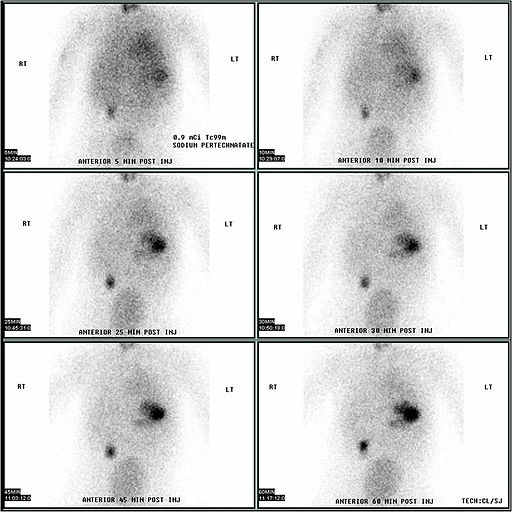Meckel's diverticulum diagnostic study of choice
Editor-In-Chief: C. Michael Gibson, M.S., M.D. [1]; Associate Editor(s)-in-Chief: Sudarshana Datta, MD [2]
|
Meckel's diverticulum Microchapters |
|
Diagnosis |
|---|
|
Treatment |
|
Case Studies |
|
Meckel's diverticulum diagnostic study of choice On the Web |
|
American Roentgen Ray Society Images of Meckel's diverticulum diagnostic study of choice |
|
Meckel's diverticulum diagnostic study of choice in the news |
|
Risk calculators and risk factors for Meckel's diverticulum diagnostic study of choice |
Overview
Technetium-99m pertechnetate radioisotope scanning or the Meckel scan is considered as the diagnostic study of choice in patients with a bleeding Meckel's diverticulum. This scan helps in the detection of the ectopic gastric mucosa within the diverticulum that leads to ulceration of the adjacent intestinal mucosa, leading to symptoms of bleeding in patients.
Diagnostic Study of Choice
Technetium-99m pertechnetate radioisotope scanning

Source: Wikimedia commons [1]
- September 2014: Guidelines for the Scintigraphy for Meckel’s diverticulum were laid down by:[2]
- Society of Nuclear Medicine and Molecular Imaging (SNMMI)
- European Association for Nuclear Medicine (EANM)
- Technetium-99m pertechnetate scanning helps in the detection of a symptomatic bleeding Meckel’s diverticulum.
- It is preferred as the investigation of choice for the diagnosis of Meckel's diverticula in children due to the following features:[3]
- High accuracy
- Noninvasive nature
- 95% specificity
- 85% sensitivity
- Approximately 50% of symptomatic Meckel's diverticula have ectopic gastric or pancreatic cells contained within them[4]
- Technetium-99m pertechnetate scanning is not preferred in adults as false negative rates are high with specificity of 9% and sensitivity of 62%.
- Indications of Meckel's scan:[5][6]
- False-positives are seen in the following conditions:
- Intussusception
- Volvulus
- Obstruction of the small intestine
- Acute appendicitis
- Carcinoid of the appendix
- Carcinoma of the cecum
- On intravenous administration, the Technetium-99m pertechnate radioisotope is taken up by the gastric mucosa.[7]
- In order to obtain a positive result, at least 1.8 cm2 of ectopic gastric mucosa in Meckel's diverticulum is required.
- A Meckel's diverticulum containing gastric mucosa manifests as a small rounded area of increased activity in the right lower quadrant.
- Normal activity simultaneously appears in the stomach.
- Technetium-99m pertechnetate scanning requires 30 images, taken at 1-minute intervals to demonstrate terminal ileum activity.
- The use of Pentagastrin in Technetium-99m pertechnetate scanning has a synergistic effect:
- Role of Pentagastrin:
- Histamine-2 (H2) receptor blocker
- Enhances radioisotope uptake by the cells:
- Promotes isotope retention
- Blocks intraluminal release of isotope
- Minimizes false negative results
- Agents promoting retention of 99m technetium pertechnetate:[8]
- Aluminum hydroxide
- Ranitidine, Cimetidine
References
- ↑ "File:Meckel's Diverticulum by Technetium-99m Pertechnetate Scan.jpg - Wikimedia Commons".
- ↑ Spottswood SE, Pfluger T, Bartold SP, Brandon D, Burchell N, Delbeke D, Fink-Bennett DM, Hodges PK, Jolles PR, Lassmann M, Maurer AH, Seabold JE, Stabin MG, Treves ST, Vlajkovic M (2014). "SNMMI and EANM practice guideline for meckel diverticulum scintigraphy 2.0". J Nucl Med Technol. 42 (3): 163–9. doi:10.2967/jnmt.113.136242. PMID 24948825.
- ↑ "Fundamentals of Pediatric Surgery - Google Books".
- ↑ Martin JP, Connor PD, Charles K (2000). "Meckel's diverticulum". Am Fam Physician. 61 (4): 1037–42, 1044. PMID 10706156.
- ↑ Lin S, Suhocki PV, Ludwig KA, Shetzline MA (2002). "Gastrointestinal bleeding in adult patients with Meckel's diverticulum: the role of technetium 99m pertechnetate scan". South. Med. J. 95 (11): 1338–41. PMID 12540005.
- ↑ Sinha CK, Pallewatte A, Easty M, De Coppi P, Pierro A, Misra D, Biassoni L (2013). "Meckel's scan in children: a review of 183 cases referred to two paediatric surgery specialist centres over 18 years". Pediatr. Surg. Int. 29 (5): 511–7. doi:10.1007/s00383-013-3270-3. PMID 23417523.
- ↑ Rerksuppaphol S, Hutson JM, Oliver MR (2004). "Ranitidine-enhanced 99mtechnetium pertechnetate imaging in children improves the sensitivity of identifying heterotopic gastric mucosa in Meckel's diverticulum". Pediatr. Surg. Int. 20 (5): 323–5. doi:10.1007/s00383-004-1189-4. PMID 15241619.
- ↑ Petrokubi RJ, Baum S, Rohrer GV (1978). "Cimetidine administration resulting in improved pertechnetate imaging of Meckel's diverticulum". Clin Nucl Med. 3 (10): 385–8. PMID 729309.